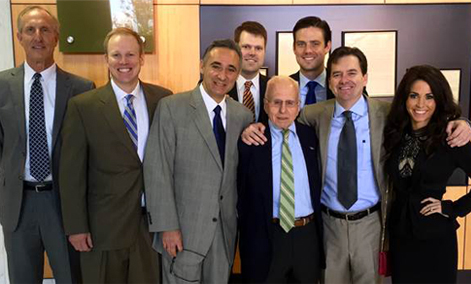A federal jury ruled Thursday that gaming company Nintendo infringed on patented motion detection technology developed by Dallas-based iLife Technologies.
The jury, which heard more than a week of evidence and arguments, awarded $10.1 million to iLife, a technology firm that develops vital sign monitors and other technology.
Munck Wilson Mandala has represented iLife for two decades, including the filing of U.S. Patent 6,864,796, which covers technology that evaluates body movement within its specific environment.
Partner Mike Wilson filed the lawsuit on behalf of iLife in 2013, claiming that Nintendo employed his client’s patented technology for motion detection provisions of its Wii gaming systems.
“To see a patent we wrote and now defended receive such a great verdict is an honor,” said Munck Wilson Mandala’s managing shareholder William “Bill” Munck.

Wilson, during closing arguments, said the “case is about respect and fairness.
“The evidence shows that the technology in this patent, [Michael] Lehrman’s patent, became the backbone for the success of the Nintendo Wii products,” Wilson told jurors during closing arguments.
“What started as an idea about detecting falls and helping people who might be injured, they discovered through their work that you could use these devices to evaluate body movement in general,” he said during an hour-long closing argument. “It became much more than what they originally set out to achieve.”
Wilson told jurors that the evidence was overwhelming that Nintendo infringed on his client’s patent.
“All of us are going to walk out of the courtroom after you give us your verdict. The team that we’ve been facing the past four years are … going to do is make phone calls back to Seattle, back to Kyoto. And they’re going to report what happened today,” Wilson argued. “That call is going to go one of two ways. Either they’re going to call back to the home office and say, ‘We got away with it. We can keep on infringing. We don’t have to respect iLife or other people’s intellectual property.’
“Or they’re going to make the phone call and say, ‘We got caught. We have to respect other people’s property rights. We have to make changes on how we deal with looking for and infringing other people’s patents.’
“You get to decide how Nintendo operates here in the United States, how they have to respect and treat other people’s intellectual property,” Wilson told jurors. “And I encourage you to make them make the second call.”
Lawyers for iLife asked jurors to award $140 million in damages, but they said Thursday that they were pleased with the $10.1 million verdict.
Efforts to obtain a comment Thursday from Nintendo were unsuccessful.
